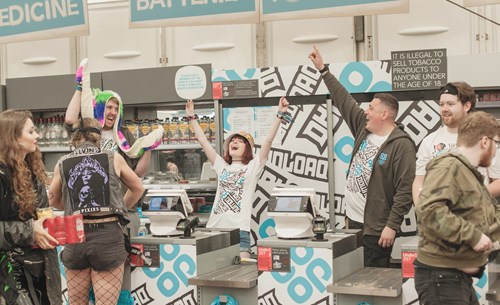A sea of half-flooded tents, the sky sparkling with a haze of glitter, pop-up vans selling burgers and fries at a price that would make even a Londoner’s eyes water – the Great British Summer has arrived in full force and with it, the return of festival season. After over a year of complete shutdown on any form of partying, as well as lingering restrictions on foreign travel, it’s no surprise that this year festivals are more of a hit than ever.
And what’s more, there’s a new addition to the line-up this summer. Between the main stage and the rave tents, Co-op supermarket pop-ups have arrived – braced and ready to get in on the action.
Yes, that’s right. Co-op, better known as a humble villager’s haven, where grandparents take a stroll to pick up their bread and milk, has – quite literally – put up shop in the heartland of the party scene.
First trialed in 2018, the Co-op festival pop-ups aren’t actually breaking news. However, the success of the initiative before the pandemic hit has led to a milestone renewal of the partnership between Co-op and Live Nation in the past few months as festival season kicks off again. The 5-year contract will see Co-op continue to open a pop-up shop at each of the 6 festivals hosted by Live Nation every summer, as well as being the primary supermarket sponsor for the events.
On a broad level, this move is a win for Co-op based purely on filling a real gap in the market. According to the Live Nation press release, the Co-op partnership will for the first time “give festival-goers a chance to buy their everyday essentials on-site, rather than carrying them into the festivals”. The convenience and practicality factors alone here are huge, enabling attendees to ‘Rock up and Stock up’, lightening their luggage load and minimising arduous planning.
However, there is more to it than just fulfilling a consumer need. In theory, any supermarket brand could play this role. What has made this a particularly smart and successful move for Co-op is a clever adaptation of their branding, allowing them to serve a cultural as well as functional purpose in this new consumer space. Co-op haven’t just shown up at Leeds and Reading with piles of grocery stock ready to sell. Instead, true to their brand they’ve arrived ready to engage with and serve a community.
This concept – community – is what Co-op is all about. It’s in ‘The Cooperative’ name, the history, and the fundamental ethos of the brand which has always been grounded in giving back part of profits to local areas through community funds.
Now traditionally, Co-op’s definition of ‘community’ has been much more geographically focused, aligning itself with local causes and organisations. The real success of this new direction into the party space though is the ability to translate this traditional community branding into a broader ideology which can more easily adapt and modernise. In this case, it’s been adapted to serve an alternative kind of fleeting ‘community’, that of festival goers who come together for a weekend of parties and music.
Co-op has really tapped into this more niche form of community, offering a shopping experience tailored to them. On top of simply selling festival-specific staples, in-store DJs ensure the shop matches the energy levels of the rest of the event, often seeing “people dancing in the aisles at 2am”. Co-op’s community care element also comes through with a sustainability initiative. Their iconic ‘reverse vending machines’ operate a deposit system for recycled material, encouraging festival goers to minimise waste and care for the festival site and its community.
Rather than becoming an add-on, through the repositioning of its community lens Co-op has managed to integrate itself into the festival experience itself, encouraging customers to see it as a member of the party.
This assimilation into a new ‘community’ also offers up opportunities outside of the festival space for Co-op. The announcement that Co-op membership and points cards will now be accepted and even pushed at the festival pop-ups hints at a move to hold onto the party goers even after the weekend is up, ensuring they leave with a membership card and good memories so that perhaps next time they need to pop out for some milk, Co-op is the first brand that comes to mind.
More robust evidence for this being the broader aim is Co-op’s equally recent installation on university campuses. After all, where do the majority of festival goers flock back to after a great British summer of raving in the rain?
Since 2019 Co-op has been the official grocery franchise of the National Union of Students, gradually opening stores across campuses with the most recent franchise opening at Keele University this month, making it the seventh so far. In a similar vein to the festival pop-ups, this new direction is a result of Co-op’s reinvention of its community focus. By expanding beyond the ‘local’, Co-op are allowing themselves to move into the more dynamic and fluid communities inhabited by younger generations. Certainly these spaces are more ambiguous and there are fewer crutches to hold onto within them, but perhaps this is what makes them all the more exciting.
So, what can we learn from Co-op’s expansion from village local to party staple?
Despite how it seems at first, the success being enjoyed by Co-op is far from a result of jumping ship when it comes to brand positioning. Rather, their strategy is all about capitalising on the existing strengths of their branding – community, social conscience, convenience – to tap into an entirely new market.
Particularly in a post-lockdown – and dare we say post-Covid – moment when the air around is already charged with change and novelty, what better moment for brands to latch onto this excitement, get creative and adapt existing USP’s to the ‘new normal’ we’re walking into?
And anyway, who wouldn’t fancy a boogie down the sandwich aisle?


